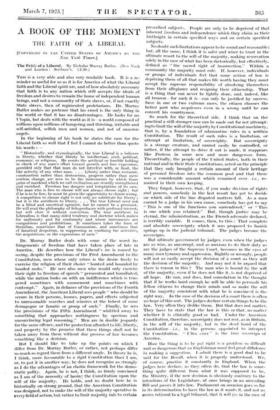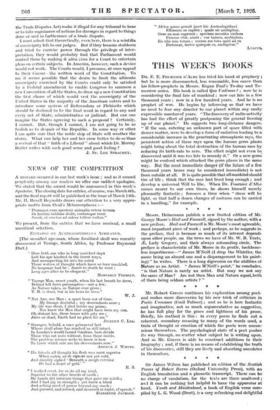A BOOK OF THE MOMENT
THE FAITH OF A LIBERAL
[COPYRIGHT IN THE UNITED STATES OF AMERICA BY THE
New York Times.] The Faith of a Liberal. By Nicholas Murray Butler. (New York
and London : Scribner's. 2.50. )
Tnis is a very able and also very readable book. It is a re- minder as useful for us as it is for America of what the Liberal faith and the Liberal spirit are, and of how absolutely necessary that faith is to any nation which still accepts the ideals of freedom and desires to remain the home of independent human
beings, and not a community of State slaves, or, if not exactly State slaves, then of regimented proletarians. Dr. Murray Butler makes no pretence that his creed is the only thing in the world or that it has no disadvantages. He looks for no l-topia, but deals with the world as it is—a world composed of
millions upon millions of hungering and thirsting, irritable and self-satisfied, selfish men and women, and not of anaemic angels.
In the beginning of his book he states the case for the Liberal faith so well that I feel I cannot do better than quote his words :-
" Historically, and etymologically, the true Liberal is a believer in liberty, whether that liberty be intellectual, civil, political, economic, or religious. He resists the artificial or forcible holding in check of any man's effort toward growth and free expression, provided only that that man do not interfere with, or limit, the like activity of any other man. . . . Liberty rather than restraint, construction rather than destruction, progress rather than mere restless change, are seen to be the' instruments by which those gains of mankind which we call civilization are steadily strengthened and enriched.- Freedom has dangers and temptations of its own. The man who is free to choose will not always choose right ; but if he is to be free, he must be given the opportunity to choose wrong. A compulsion to choose right is not only no substitute for liberty ; but it is the antithesis to liberty. . . . The true Liberal need not be a blind and uncritical optimist, but he cannot be a pessimist. He will read the philosophy of Schopenhauer with profound interest, but will close it without conviction. The true antithesis to Liberalism is that many-sided tendency and doctrine which makes for uniformity and for conformity and whose instruments are compulsions and prohibitions. It sometimes takes the form of Socialism, sometimes that of Communism, and sometimes that of fanatical despotism, in suppressing or confining the activities, the acquisitions, or the expressions of men."
Dr. Murray Butler deals with some of the worst in- fringements of freedom that have taken place of late in America. He describes how the Liberal's ire is roused by seeing, despite the provisions of the First Amendment to the Constitution, men whose only crime is the desire freely to exercise the religion of their choice "hunted and hounded by hooded mobs." He sees also men who would only exercise their right to freedom of speech " persecuted and humiliated, while the nation looks on with an indifference which is tem- pered sometimes with amusement and sometimes with contempt." Again, in defiance of the provisions of the Fourth Amendment, the American Liberal sees people " who should be secure in their persons, houses, papers, and effects subjected to unreasonable searches and seizures at the behest of some demagogue or fanatic or group of such." Finally, he sees the provisions of the Fifth Amendment " whittled away to something that approaches nothingness by specious and unconvincing legal reasoning." Men are in double jeopardy for the same offence, and the protection afforded to life, liberty, and property by the promise that these things shall not be taken away from them without due process of law becomes something like a derision.
But I should like to take up the points on which I differ from Dr. Murray Butler, or rather, not perhaps differ so much as regard them from a different angle. In theory he is, I think, more favourable to a rigid Constitution than I am, or, to put it in another way, he does not recognize as strongly as I do the advantages of an elastic framework for the demo- cratic polity. Again, he is not, I think, as firmly convinced as I am of the necessity of basins the Constitution upon the will of the majority. He holds, and no doubt here he is historically on strong ground, that the American Constitution was designed, not to make the will of the majority operative in every field of action, but rather to limit majority rule to certain prescribed subjects. People are only to be deprived of that inherent freedom and independence which they claim as their birthright in certain specified ways and on certain specified subjects.
No doubt such limitations appear to be sound and reasonable; but, all the same, I think it is safer and wiser to trust in the ultimate resort to the will of the majority, making reservation solely in the case of what has been rhetorically, but effectively, defined as " the sacred right of insurrection." Within a community the majority must rule. If, however, individuals or groups of individuals feel that some action of law is depriving them of all that makes life worth having they must accept the supreme responsibility of absolving themselves from their allegiance and resigning their citizenship. That is a thing that can never be lightly done, and, indeed, like all treason—for such it is--can only be justified by success. Save in one or two extreme cases, the citizen chooses the better part who acquiesces even in a wrong until he can convert his countrymen.
So much for the theoretical side. I think that on the practical a still stronger ease can be made out for not attemPt-
Mg to limit the will of the majority by Constitutional machinery-,
that is, by a foundation of adamantine rules in a written Constitution. The result of such rules is a limitation, or attempt at limitation, of sovereighty. But sovereignty is a strange creature, and cannot easily be controlled, or
rather, if the attempt to drive it out is made, it reappears like Proteus in some new and more dangerous form. Theoretically, the people of the United States, both in their national and in their State Constitutions, acted on the principle that they only brought a certain amount of their heritage of personal freedom into the common pool and that there was a considerable amount which remained over—i.e., re- mained in their own keeping.
They forgot, however, that, if you make division of rights and powers, somebody in the last resort has got to decide on which side of the line disputed matters fall. As a man cannot be a judge in his own cause, somebody has got to say " This is one of the functions you surrendered," or " This is one which you retained." But, though justice may be eternal, the administration, as the French advocate declared, is terribly variable. It conies, then, to this : That complete and absolute sovereignty which it was proposed to banish springs up in the judicial tribunal. The judges become the sovereigns.
But ultimate government by judges, even when the judges arc as wise, as uneorrupt, and as anxious to do their duty as are the judges of the Supreme Court, becomes in the eyes of many men tyranny and oppression. Rightly or wrongly, people will not as easily accept the decision of a court as they will the decision of the majority. And may not it be argued that there is reason in this ? The man who is bound by the will of the majority, even if he does not like it, is not deprived of all hope. He can, and does, find consolation in the thought that if he works hard enough he will be able to persuade his fellow citizens to change their minds and so make time will of the majority consistent with what he is convinced is the right way. In the case of the decision of a court there is often no hope of this sort. The judges declare certain things to be the law. Very often they dislike them. But that does not matter. They have to state that the law is this or that, no matter whether it is ethically good or bad. Under the 'American Constitution, therefore, sovereignty does not rest, as in Britain, in the will of the majority, but in the dead hand of the .Constitution—i.e., in the persons appointed to interpret the Constitution. " Ultra vires- is the true sovereign of America.
How the thing is to be put right is a problem so difficult and so dangerous that an Englishman must feel great diffidence
in making a suggestion. I admit there is a good deal to be
said for the Recall, when it is properly understood. We, of course; practise it constantly in England. When the
judges here declare, as they often do, that the law is some- thing quite different from what it was supposed to be, the Ministry, if the new decision is obviously contrary to the
intentions of the Legislature, at once brings in an amending Bill and passes it into law: Parliament on occasion goes so far in its determination to haVe the law as it wants it, and not as seems rational to a legal tribunal, that it will (as in the ease of the Trade Disputes Act) make it illegal for-any tribunal to hear or to take cognizance-of actions for damages in regard to things done or said in furtherance of a trade dispute.
I must admit that theoretically, even here, there is a scintilla of sovereignty left to our judges. But if they became stubborn and tried to exercise power through the privilege of inter- pretation, they would probably find that Parliament would control them by making it ultra vires for a .Court to entertain pleas on certain subjects. In America, however, such a device would not work. The Courts would, I presume, ut once appeal to their Caesar—the written word of the Constitution. To me it seems possible that the desire to limit the ultimate sovereignty exercised by the Courts could only be satisfied by a Federal amendment to enable Congress to summon a new Convention of all the States, to draw up a new Constitution the first clause of which would vest the sovereignty of the United States in the majority of the American voters and to introduce some system of Referendum or Plebiscite which should be declared to be the final word in regard to any and . every act of State, administrative or judicial. But can one imagine the States agreeing to such a proposal ? Certainly, I cannot. But, though I cannot, I am not going to be so foolish as to despair of the Republic. In some way or other I am quite sure that the noble ship of State will weather the storm. What can help her and her crew better to do so than . a revival of that " faith of a Liberal " about which Dr. Murray Butler writes with such good sense and good feeling ?
J. ST. Lou STRACHEY.



























































 Previous page
Previous page